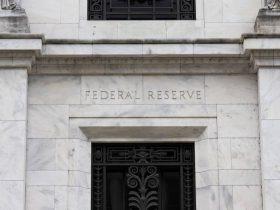The payments sector gave two very different messages this week. Visa said consumers were happily spending, while French payments company Worldline warned about an economic slowdown in Europe.
The stock market reaction showed investors were paying more attention to
Worldline
(ticker: WLN.France), whose shares plunged on Wednesday, than reassured by
Visa
(V). U.S. stocks like
PayPal Holdings
(PYPL) and
Block
(SQ) dropped on Wednesday despite limited exposure to European markets.
On the face of it, the falls for American stocks were puzzling. Worldline is far less of a global bellwether than Visa, and faces a company-specific problem of terminating some client contracts. However, Worldline highlighted the difficult moment many payment stocks find themselves in.
The economic outlook is darkening around the world. Worldline pointed to Germany as a particular pain point, and investors fear other countries will face similar challenges. While consumer spending has been resilient in the U.S., fears of a recession haven’t dissappeared. Spending could take a hit if the Federal Reserve keeps interest rates higher for longer, as it has suggested it might need to do.
Visa executives,for their part, said the company isn’t assuming a global recession in its outlook On Thursday, however,
Mastercard
(MA) said that growth slowed in October both in the U.S. and internationally .
“There are risks to outlooks not including or only including very mild spending slowdowns in the coming quarters,” wrote Oppenheimer analyst Dominick Gabriele, in a research note on Visa. He kept an Outperform rating on the stock.
Beyond the global economy, there have been major questions about the business models of many payment stocks.
Visa and
Mastercard
‘s card networks still have a huge competitive advantage. The same isn’t true of payment processor upstarts such as PayPal and Block, which largely depend on e-commerce spending. Buy now, pay later specialists like
Affirm Holdings
(AFRM), whose shares also dropped on Wednesday, are also exposed to consumer spending.
Also, shares of payment processors have been hit by worries about margins. The companies face competition from large technology companies like
Apple
(AAPL).
Valuations might also have become stretched.
Fidelity National Information Services
(FIS) agreed in July to sell a majority stake in payments-provider Worldpay to a private-equity firm at a valuation of $18.5 billion, marking it down from a price tag of $43 billion when the companies combined in 2019. The news also raised questions about the pursuit of scale via consolidation in the industry.
Meanwhile, fast-growing disrupters have also started to look less attractive. Private payments company Stripe sold shares at a valuation of around $50 billion in March, slashed from $95 billion in 2021, according to The Wall Street Journal. Shares of rival
Adyen
(ADYEN.Netherlands) fell nearly 40% in a single day in August when the Dutch company said tougher competition in North America caused it to miss growth expectations.
The question now is whether the panic has gone too far. Mizuho Securities’ Dan Dolev wrote in a research note the U.S. stock reaction to the Worldline warning was overblown.
However, a recovery will likely depend on both fears of recession fading and companies showing sustainable margin improvement in the face of competition.
For now, investors appear to agree with Mizuho’s Dolev. PayPal stock added 0.6% on Thursday, after closing down 5% on Wednesday. Block was up 2.4%. Shares fell 8% on Wednesday. Affirm advanced 2.1% after falling 15% on Wednesday, when shares were downgraded to Sell by Compass Point.
Write to Adam Clark at [email protected]
Read the full article here













Leave a Reply